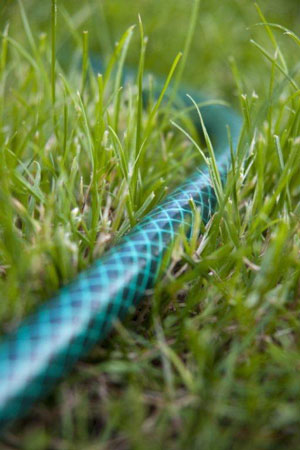PVC RECYCLING
“VinyLoop” process creates new benchmark for PVC recycling / Study sees better performance
 VinyLoop is used as an inner lining in garden hoses, saving 20% in carbon dioxide emissions (Photo: VinyLoop) |
The PVC recycling process developed by “VinyLoop”, a partnership of PVC producer SolVin (Brussels / Belgium; www.solvinpvc.com), French mixed membranes manufacturer Serge Ferrari (La Tour du Pin; www.sergeferrari.com) and two smaller partners, is said to reduce global warming potential by 39% and primary energy demand by 46% compared to conventional recycling processes using virgin PVC compounds.
The evaluation was part of the VinyLoop Eco-Footprint Study, a recently completed life cycle assessment (LCA). DEKRA Industrial, part of the international expert services group, confirmed that the process confirms to ISO standards and can be used to support business decisions.
Since 2002, VinyLoop has been recycling 10,000 t/y of PVC waste annually at its Ferrara / Italy facility – see Plasteurope.com of 07.03.2002. Most of the waste material fed into the process comes from PVC cable sheathing and PVC-coated PET textile composites from truck tarpaulins. Due to its high quality, the company says the recycled material can substitute virgin PVC in garden hose linings, roofing or tunnel membranes, to mention just two applications.
SolVin and partners offer to prepare full LCAs for their clients’ products. Garden hoses with inner linings made of material recycled by the VinyLoop process save 20% of global warming potential on average, says Paolo Groppi, general manager of VinyLoop.
e-Service:
"The VinyLoop Eco-Footprint Study" as a PDF document
"Executive Summary of The VinyLoop Eco-Footprint Study" as a PDF document
The evaluation was part of the VinyLoop Eco-Footprint Study, a recently completed life cycle assessment (LCA). DEKRA Industrial, part of the international expert services group, confirmed that the process confirms to ISO standards and can be used to support business decisions.
Since 2002, VinyLoop has been recycling 10,000 t/y of PVC waste annually at its Ferrara / Italy facility – see Plasteurope.com of 07.03.2002. Most of the waste material fed into the process comes from PVC cable sheathing and PVC-coated PET textile composites from truck tarpaulins. Due to its high quality, the company says the recycled material can substitute virgin PVC in garden hose linings, roofing or tunnel membranes, to mention just two applications.
SolVin and partners offer to prepare full LCAs for their clients’ products. Garden hoses with inner linings made of material recycled by the VinyLoop process save 20% of global warming potential on average, says Paolo Groppi, general manager of VinyLoop.
e-Service:
"The VinyLoop Eco-Footprint Study" as a PDF document
"Executive Summary of The VinyLoop Eco-Footprint Study" as a PDF document
23.03.2012 Plasteurope.com 857 [221881-0]
Published on 23.03.2012

 German version of this article...
German version of this article...